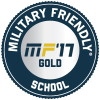The Ten Best Tips from the "Classroom to Career" Alumni Panel
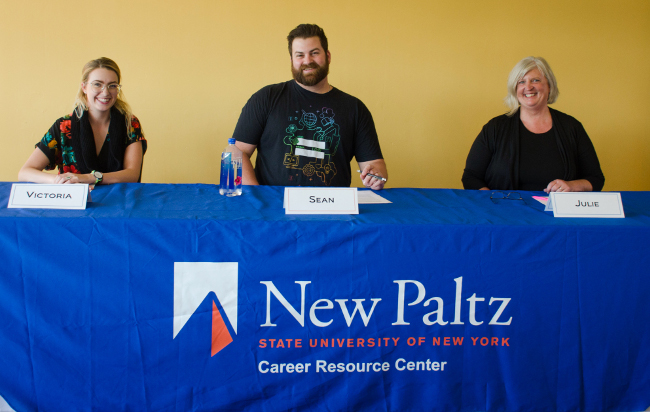
If you want advice on how to navigate today’s tough job market and find rewarding careers, listen to the personal stories of three inspiring alumni from the College of Liberal Arts & Sciences.
The Career Resource Center and the College of Liberal Arts & Sciences hosted its third annual “Classroom to Career: The Value of a Liberal Arts Degree” on October 12 in the College Terrace. The event brings alumni from different disciplines back to campus each fall to share their wisdom with undergraduates.
Here are 10 great tips from this year’s panelists.
1. Recognize the Skills You’ve Gained Pursuing a Liberal Arts Degree
As a liberal arts major, it’s important to recognize the many valuable skills you’re acquiring and be able to articulate those skills to future employers.
Julie Robbins ’95 (Economics) co-founded the co-working space One Epic Place in New Paltz. Robbins works with entrepreneurs daily and credits her liberal arts degree with developing her interpersonal skills, enabling her to juggle multiple priorities and think on her feet. “I think that is the beauty of a liberal arts degree,” she said. “You get a more diverse degree. You’re not pigeon-holed into one thing.”
2. When Interviewing, Be Yourself
As the Assistant Director of Development for Alumni at Bard College, Victoria Morrell ’13 (History, Religious Studies) relies on her excellent communication skills daily. But she recently realized that she didn’t always present herself well in interviews.
“I wished that someone had sat me down and said, ‘You don’t have to put on your grownup voice; you just need to be yourself.’ Employers want to know you’re an authentic person and have thoughts and beliefs,” she said.
At her interview at Bard a year ago, Morrell chatted about yoga prior to her interview, which made her seem less like an overly anxious young professional focused on saying all the right things and more like an interesting potential co-worker.
“These people who you’re interviewing with are going to become your colleagues later on if you get that position, and some of them are going to be your friends, so when you into an interview, don’t think of it as ‘This person’s here to judge me,” but think of it as ‘I’m about to meet a new friend,’” she advised.
3. Decide if Graduate School is Right for You
Graduate School can be a rewarding educational experience that allows you to deepen your knowledge of an area of great personal interest and help you advance in your career. But give serious consideration to your educational and career goals before taking the leap.
Sean Haberkorn ’11 (Journalism, Public Relations concentration) worked a few jobs before discovering his passion as the Manager of Client Relations at Indeed.com. He decided to forgo graduate school and instead focus on building his career. “Once I was able to sit down and identify, ‘I want to grow with this company, I focused on doing just that,” he said.
4. Embrace Your Own Path
In life, expect the unexpected. Robbins planned to pursue a Ph.D. in environmental economics when a “surprise baby” halted her plans. Instead of pursuing a Ph.D., she founded her own businesses and discovered a passion for helping fellow entrepreneurs.
“Every road you take in life is worth something,” Robbins noted. “Just because you didn’t go down this one road you thought you were going to go down, embrace the road you did go down,” she said.
Part of that journey is defining your own version of success, noted Robbins, who advised students to always follow their interests and passions.
5. Cultivate Your Passions
Unsure of what your passions are? Examining your habits and preferences will give you valuable clues.
Initially a journalism major, Morrel discovered that her desire to constantly express her opinions might not make her the most impartial reporter. In contemplating a change in major, she considered what classes made her excited to get out of bed in the morning and what television programs she tuned into most. Recognizing that she enjoyed dissecting texts and preferred historical documentaries to Keeping Up with the Kardashians, she opted to study history instead.
“Realize that everything you do on a daily basis informs what your passions are,” Morrell noted. “What makes you a person is what you’re passionate about—you just have to dissect it and think about it a little more.”
Robbins likened the process to stretching a muscle. “Just start to notice each day the things that make you really happy or get you excited,” she said.
6. Grow Your Network
Though networking might make you think of awkward conversations at cocktail parties, you need not be afraid. Talking to people can help you expand your professional network and lead to jobs and other valuable experiences.
Haberkorn credits his career success with forging good relationships at every job and internship he had. While working part-time at Gourmet Pizza in New Paltz, Haberkorn reconnected with a coworker from his first job who worked for Indeed.com and gave him his business card. “If I didn’t keep in touch with that person from my first role, if I wasn’t always keeping in contact with people when I left a job and didn’t burn any bridge, and kept those positive connections, I wouldn’t be where I am today,” he said.
7. Do Your Research
The research skills you gain in your major will be invaluable for your interview preparations.
As a hiring manager, Haberkorn doesn’t look for candidates with particular degrees. He looks for people who are passionate, genuinely interested in the company, and most importantly, prepared. “I always ask, ‘What do you know about Indeed? What do you know about this role?’ Because I want to see you did the research and understand the company, understand what you’re doing. If you can’t do the preparation for the interview, you probably won’t be able to do the preparation that goes into the work,” he said.
8. Be Confident
Whether you’re an introvert or an extravert, project confidence when searching for a job.
Robbins said confidence is “hands-down” the most important quality she looks for when hiring. “When a confident person walks in the room, you feel it right away,” she said. “There has to be good communication skills, eye contact.”
Identifying preparedness as the key to confidence, Haberkorn stressed the importance of being well informed and prepared for potential interview questions. “You could be a quiet person and still show that you’re super passionate about something. I just want to see that you’re engaged,” he said. “When you’re interviewing, be yourself, be confident, be passionate and be prepared to speak to why you should be in that role."
9. Take Advantage of Opportunities
As a New Paltz student, a wealth of opportunities are available to you to explore potential careers.
Morrell stressed the value of conducting informational interviews with alumni and professionals in careers of interest and visiting the Career Resource Center and Alumni Affairs Office for more resources. “These services exist even after you graduate,” she said. “They want to hear from you.”
10. Breathe
If thinking about your future makes you hyperventilate, remember to breathe.
“If you don’t know where you want to go after college, it’s okay,” said Haberkorn, who advised students to say yes to opportunities but never settle. “You need a job after school. It’s okay if it’s not what you want to do for the rest of your life, because you’ll get there,” he said, recounting his own experiences of finding the right career fit.
“Keep trying until you get to somewhere where you’re truly happy, where you really like what you’re doing. It doesn’t have to be the first step in the road; you’ll get there,” he said.
--
For information about resume writing, interview skills and other career-related information, visit the Career Resource Center or contact the LA&S career specialist Emily Zurner.
Women's Summit Alumnae Share Secrets of Success
Seven years into her broadcasting career, Sapna (Sklyer) Srivastava ’04 (Journalism) had an “Aha moment.” After winning three radio awards, Srivastava began to see herself not as a struggling young journalist, but a capable professional who learned from her mistakes and acquired the skills she needed to succeed. Her self-confidence bolstered by the industry recognition, Srivastava thought, “I might be good at this.”
Having faith in one’s ability to learn and grow was a key message of the March 1 Women’s Leadership Summit, which brought alumnae and thought leaders to campus to share professional advice, answer student questions and empower the next generation of New Paltz graduates.
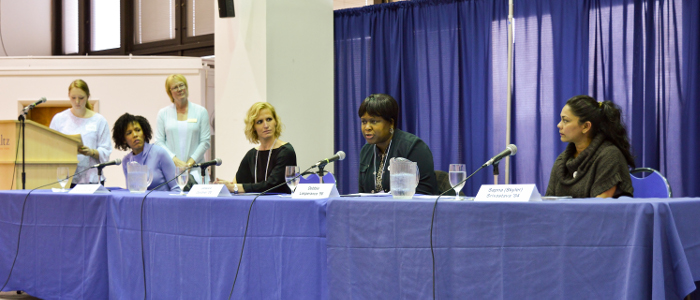
Srivastava, now a news anchor for NBC 2, joined fellow alumnae Luz Avila-Kyncl ’96 (Psychology), Jessica Gardner ’00 (Journalism) and Debbie Lesperance ’96 (Black Studies) at an afternoon breakout session for College of Liberal Arts & Sciences students. Nancy Johnson, a professor of English, co-moderated the event with Hannah Phillips, a student in the English master’s program.
Gardner, a former journalist for the Times Herald-Record, honed her marketing skills at three Hudson Valley companies before founding her own full-service marketing firm, Media Solstice Marketing and PR. Gardner championed the value of a strong work ethic and advised students to strive for continuous self-improvement. “Don’t focus on what you don’t know,” Gardner urged. “It’s fine to be just where you are while you fight to make it better. … When in doubt, put your head down and get to work.”
Lesperance transitioned to higher education administration after working for two years with at-risk youth. She sought to become an admissions director, and quickly moved up the administrative ladder. Now the director of admissions at Columbia School of Social Work, Lesperance advised students to set goals, “communicate to the person in the role you want to be in in the next few years and follow up with professional development opportunities.”
All of the panelists stressed the importance of having a professional mentor. Avila-Kyncl, a self-employed nutrition coach and wellness counselor, took it a step further, advising students to find three. “Look for someone 10 years behind you, someone at the same level, and 10 years ahead of you,” said Avila-Kyncl, who remains in touch with her college mentor while she herself mentors others seeking career guidance.
Beyond modeling success and offering inspiration, the alumnae shared several concrete tips for students seeking a leg up in the job market. Students should scrub their social media to present a professional image to potential employers, network with people in their fields of interest, take advantage of internships and join professional organizations.
And how can women succeed in male-dominated fields? Lesperance recommended having “tough skin” and recognizing that a woman’s role in an office is not “for everyone to like [her].”
Gardner urged women to not think in terms of limitation, then changed the conversation. She cautioned the mostly female audience to resist envying other women’s success. “Someone else’s success is not your failure,” she said. “Someone has walked a path that you can now follow.”
The Women’s Leadership Summit was presented by the SUNY New Paltz Foundation. For speaker profiles and other information, visit the summit’s website.
Political Science Alumnus Gives "Recession-Proof" Career Advice
Since graduating from New Paltz, Dylan Hayden ’03 (Political Science) has worked in several positions in state and federal government, as well as the military and nonprofit sector. On April 6, he returned to his alma mater to discuss his unconventional career path and offer advice to undergraduates interested in public service careers.
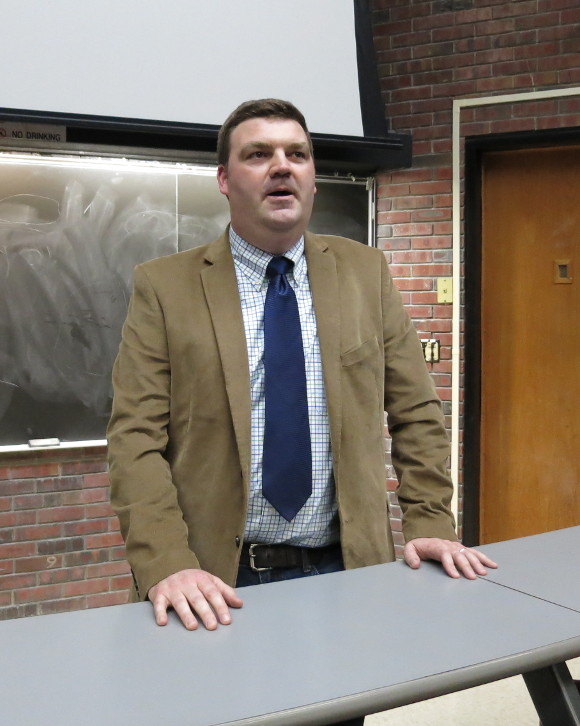 Hayden enlisted in the U.S. Navy his senior year at New Paltz and trained as a cryptologic technician and linguist. He completed 99 weeks of Arabic language immersion at the Defense Language Institute in Monterey, California, and later received additional training to become one of the Navy’s first five Pashtu-Afghan linguists.
Hayden enlisted in the U.S. Navy his senior year at New Paltz and trained as a cryptologic technician and linguist. He completed 99 weeks of Arabic language immersion at the Defense Language Institute in Monterey, California, and later received additional training to become one of the Navy’s first five Pashtu-Afghan linguists.
After six years in the Navy and a tour in Afghanistan, he enrolled in graduate school at the Fels Institute of Government at the University of Pennsylvania and earned a Master of Public Administration degree. Knowing that he wanted a career in public service, Hayden applied to Governor Andrew Cuomo’s Empire State Fellows Program and was selected from over 950 applicants to join the first nine-person class.
The program sought to train mid-career professionals with advanced degrees working in the private or nonprofit sectors to assume senior management positions in the state government, building what Cuomo called a “back bench” of qualified staff ready to assume leadership roles upon current officials’ retirement.
During his two-year appointment, Hayden was paired with mentors from the Department of Labor and the Division of Criminal Justice Services. He participated in several projects for the governor’s office, including creating a brochure for the state’s Wine and Beer Summit, drafting a 310-page public policy book that included a push for an increase in the state’s minimum wage, and helping to organize a veteran and military families summit. “These were all unique experiences that a year before, I would’ve never seen coming,” Hayden said. “It was really valuable.”
After developing skills in performance management during his work as an Empire State Fellow, Hayden helped to transform the Palo Alto, California, hospital system for the U.S. Department of Veterans Affairs, working closely with the department’s chief of prosthetics. “I knew absolutely nothing about prosthetics, but I knew generally about process improvement and how to look at a variety of different factors and piece them together. Being a former cryptologist and figuring out puzzles and solving problems were good general skills that I brought to that job,” Hayden said.
Hayden drew upon the transferrable skills he learned at New Paltz, the University of Pennsylvania, and his prior work experiences to land his current job as a program analyst with the U.S. Department of Housing and Urban Development (HUD). Hayden works in the Baltimore Office of Public and Indian Housing, which oversees 60 local public housing authorities. He monitors performance and conducts risk assessments for housing authorities throughout the Mid-Atlantic Region, which includes West Virginia and most of Maryland.
During the Q&A, Hayden told students that they should prepare for the vicissitudes of the job market by becoming adept at problem solving, which he has demonstrated throughout his career. “Regardless of what the problem is … whether it’s prosthetics or housing or workforce development, criminal justice, economic development, wine, beer, spirits, everything – if you can put the pieces together in a way that makes sense to whomever you work for and do it better than the other guy, that’s the key,” he said.
Hayden also advised students to take advantage of internships and other experiential learning experiences like the United Nations (UN) Semester and Harvard Model UN to gain a greater understanding of the problems they will face in the workforce and “start thinking about them before [they] actually get to that position.”
In an uncertain economy, Hayden said students must always be willing to learn new skills. He is pursuing his doctorate in public administration from the University of Baltimore in an effort to have the “most unimpeachable credentials” in his field while Congress mulls across-the-board federal budget cuts, which will likely include staffing cuts.
“I want to make myself as recession-proof as I can,” he said.
Hayden’s talk was sponsored by the Department of Political Science and International Relations and was one of several featured events of the Career Resource Center’s Public Service Week.
LA&S Alumni Share Career Success Stories
In her remarks at the Oct. 13 “Classroom to Career: The Value of a Liberal Arts Degree” event, College of Liberal Arts and Sciences Dean Laura Barrett argued that flexibility of mind, and not narrow job training, best equips students to enter the workforce.
Employers, said Barrett, “value habits of mind, effective critical thinking, articulate communication, intellectual curiosity, flexible and creative problem solving that liberal arts and sciences teach.”
Empowering stu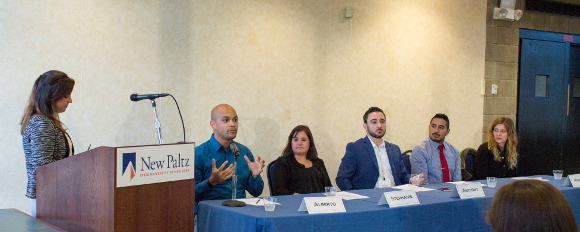 dents to recognize and articulate the skills they’ve gained through the study of the liberal arts was a primary goal of the second-annual event, organized by Emily Zurner, Senior Career Specialist in the Career Resource Center, in collaboration with the College of Liberal Arts and Sciences.
dents to recognize and articulate the skills they’ve gained through the study of the liberal arts was a primary goal of the second-annual event, organized by Emily Zurner, Senior Career Specialist in the Career Resource Center, in collaboration with the College of Liberal Arts and Sciences.
The five alumni panelists drew connections between their liberal arts educations and career successes, and provided advice and encouragement to students embarking on professional careers. Current graduate student Nicole St. Onge ’16 (Communication Studies – Public Relations) moderated the panel, which was followed by an audience Q&A and networking reception.
Alberto Aquino ’12 (Political Science) said studying political science allowed him to gain a greater insight into social issues like poverty, racial injustice and income inequality, and strengthened his desire to help others as an educator. Aquino became certified as a math teacher though Teach for America and is now director of the Armory College Prep Middle School Program in New York City.
“When I look back to the past, what I was really looking for at that time was to help people in any way I could, whether it was through education or any non-profit work, and I think my political science background gave me sense of which direction to go towards,” he said.
Stephanie Adika ’07 (Women’s Studies), events manager at the Simons Foundation in New York City, has worked with diverse partners throughout her career. She credited her women’s studies and political science coursework with helping her to communicate with others around the globe while being mindful of cultural differences. “I could be on the phone with someone in an Arab nation and a couple hours later, on the phone with someone in Mexico. Understanding the multicultural aspect of the world, which you can really get from a liberal arts degree, to me is one of the most important things that I learned,” she said.
Angelica Snyder ’08 (Sociology – Criminology Concentration) works as a prospect researcher at SUNY New Paltz and utilizes the communication and analysis skills she learned as an undergraduate. She noted that writing papers provides students with essential workforce training. “You have to make a case when you write, it has to be cogent, it has to be succinct and a lot of times you have to convince somebody of something, and that’s really important,” she said. “Being able to express yourself to get your point across, I think that’s one of the most valuable things I learned here, and it keeps on giving. I use it every day,” she said.
The panel’s most recent graduate, Joshua Galow ’16 (Anthropology), landed a job as the Vice President of Delegate Engagement at Skytop Strategies in New Paltz by attending an on-campus career fair. He researched the company, asked relevant questions and drew upon his own studies of anthropology and sociology to connect his work to the company’s mission. Galow advised students to convey to potential employers “what value you can bring to an organization based on what your passion is and what you’re learning here at the school.”
Anthony Church ’07 (Psychology), ’13g (MBA) described his college career as a “journey” that allowed him to follow his varied interests in psychology, international relations, philosophy and other disciplines. Church, the Vice President of Operations at Interact Marketing in New Windsor, said his ability to connect with others and think critically have served him well in life and business.
Church echoed Dean Barrett by saying that narrow, professional training isn’t appropriate for most jobs. “Sometimes those in the liberal arts program are concerned or have some anxiety that they are maybe learning things that aren’t going to be directly applicable to a job,” he said. “Most jobs that are out there don’t have a specific degree associated with them. You can’t do a better job of preparing yourself for those jobs than you can by exposing yourself to the concepts that you get through a liberal arts degree.”
Learn more about offerings available at the Career Resource Center by visiting the center’s website.
LA&S Alumni Return to Talk Careers with Current Students
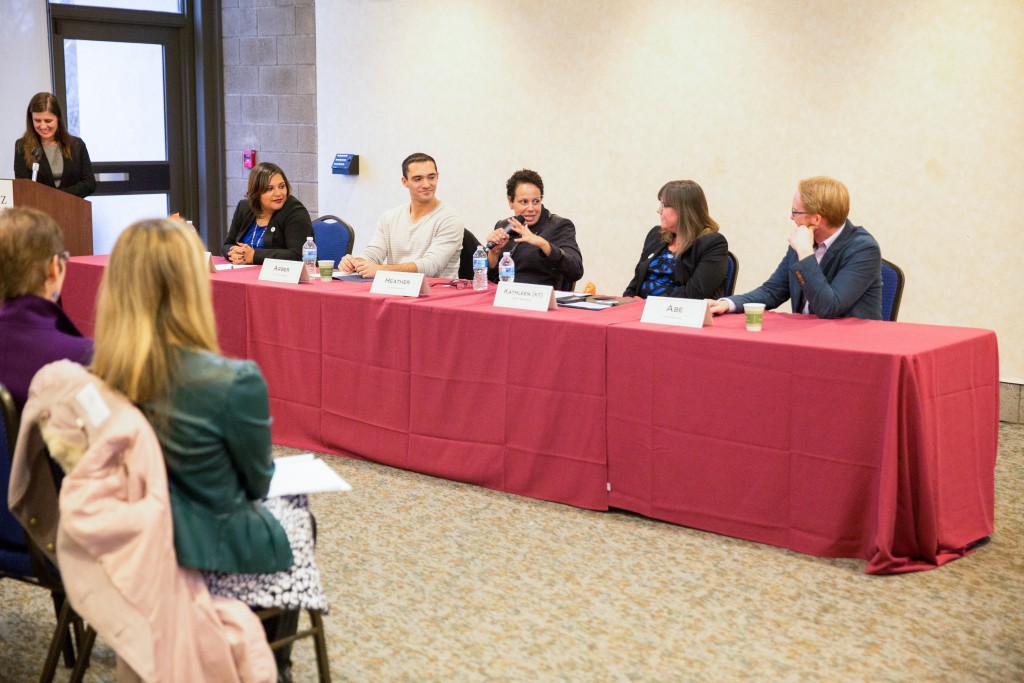 “We know that today’s graduates are likely to have several jobs before they retire,” said Laura Barrett, dean of the College of Liberal Arts & Sciences at SUNY New Paltz. “Job satisfaction requires a sense that we’re doing something meaningful, and providing a service to society. Degrees in the liberal arts not only open up a wide array of career opportunities; they prod us to challenge ourselves and continue to grow.”
“We know that today’s graduates are likely to have several jobs before they retire,” said Laura Barrett, dean of the College of Liberal Arts & Sciences at SUNY New Paltz. “Job satisfaction requires a sense that we’re doing something meaningful, and providing a service to society. Degrees in the liberal arts not only open up a wide array of career opportunities; they prod us to challenge ourselves and continue to grow.”
So began a recent panel discussion, “Classroom to Career: The Value of a Liberal Arts Degree,” featuring five alumni of the College of Liberal Arts & Sciences. Each speaker represented a different major and a different career path, but all agreed that their degrees, and the educations they stand for, have proven tremendously valuable in both their professional lives and in their personal and intellectual growth.
“When people would ask me, ‘What are you going to do with that degree?’ I felt confident in answering, ‘I can do whatever I want with it,’” said Claudette Aldebot ’06 (Spanish), a Marketing and Recruiting Manager at New York Life.
Arber Cobaj ’15 (Philosophy), Director of Program Development at Skytop Strategies, contributed a perspective drawn from his experience as a key member of a Hudson Valley start-up.
“No matter how well-run a company is, when it is this young there are going to be roles and activities that are undefined or not quite understood,” Cobaj said. “The flexibility of mind that I developed as a philosophy major helps me to step into these roles and conceptualize ways I might be able to contribute. From day one at this company, my role has been to build a role for myself. Thanks to my research background, that feels like a beautiful spot to be in.”
Other panelists counseled student attendees to trust and rely on the skills they gain as liberal arts majors when it comes time to seek employment.
“I tell my students all the time, if you learn one thing in college, make sure you learn how to communicate, both via the written and the spoken word,” said KT Tobin ’92 (Sociology), Associate Director of The Benjamin Center. “Effective communication transcends any specialized or substantive knowledge. It doesn’t matter what kind of company you’re working for – employers are going to want someone who can get up and speak on that company’s behalf.”
“It took me a long time to learn how important it is to do your own research when you are preparing to join the workforce,” said Heather Graham ’97 (Black Studies), Digital Director at the Daily Gazette. “Researching the company you are going to interview dramatically increases the odds that you’ll be invited back. Realizing that made me much more confident, because as a liberal arts major learning how to research well and research efficiently was a big part of my education.”
“Classroom to Career: The Value of a Liberal Arts Degree” was organized and hosted through a joint effort of the College of Liberal Arts & Sciences and Emily Zurner, Senior Career Specialist in the Career Resource Center.



 Hayden enlisted in the U.S. Navy his senior year at New Paltz and trained as a cryptologic technician and linguist. He completed 99 weeks of Arabic language immersion at the Defense Language Institute in Monterey, California, and later received additional training to become one of the Navy’s first five Pashtu-Afghan linguists.
Hayden enlisted in the U.S. Navy his senior year at New Paltz and trained as a cryptologic technician and linguist. He completed 99 weeks of Arabic language immersion at the Defense Language Institute in Monterey, California, and later received additional training to become one of the Navy’s first five Pashtu-Afghan linguists. dents to recognize and articulate the skills they’ve gained through the study of the liberal arts was a primary goal of the second-annual event, organized by Emily Zurner, Senior Career Specialist in the Career Resource Center, in collaboration with the College of Liberal Arts and Sciences.
dents to recognize and articulate the skills they’ve gained through the study of the liberal arts was a primary goal of the second-annual event, organized by Emily Zurner, Senior Career Specialist in the Career Resource Center, in collaboration with the College of Liberal Arts and Sciences. “We know that today’s graduates are likely to have several jobs before they retire,” said Laura Barrett, dean of the College of Liberal Arts & Sciences at SUNY New Paltz. “Job satisfaction requires a sense that we’re doing something meaningful, and providing a service to society. Degrees in the liberal arts not only open up a wide array of career opportunities; they prod us to challenge ourselves and continue to grow.”
“We know that today’s graduates are likely to have several jobs before they retire,” said Laura Barrett, dean of the College of Liberal Arts & Sciences at SUNY New Paltz. “Job satisfaction requires a sense that we’re doing something meaningful, and providing a service to society. Degrees in the liberal arts not only open up a wide array of career opportunities; they prod us to challenge ourselves and continue to grow.”